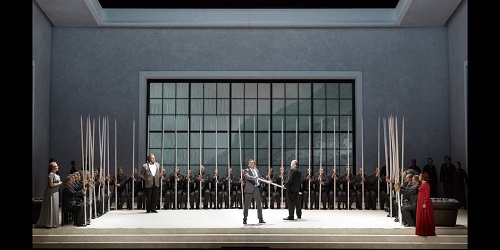 Germany Wagner, Götterdämmerung: Staatskapelle and Staatsopernchor Dresden / Christian Thielemann (conductor), Semperoper, Dresden, 1.11.2017. (JMI)
Germany Wagner, Götterdämmerung: Staatskapelle and Staatsopernchor Dresden / Christian Thielemann (conductor), Semperoper, Dresden, 1.11.2017. (JMI)

Cast:
Brünnhilde – Nina Stemme
Siegfried – Andreas Schager
Hagen – Falk Struckmann
Gunther – Iain Paterson
Gutrune – Edith Haller
Waltraute – Christa Mayer
Norns – Okka von der Damerau, Simone Schröder, Christiane Kohl
Woglinde – Christiane Kohl
Wellgunde – Sabrina Kögel
Flosshilde – Simone Schröder
Production:
Director – Willy Decker
Sets – Wolfgang Gussmann
Costumes – Wolfgang Gusmann/Frauke Schernau
The Ring of the Nibelung that Christian Thielemann began two years ago has now reached its culmination. The full Tetralogy will be performed in January and February in one of the hottest events around, as far as ticket sales go. This Twilight of the Gods has been as exceptional as one might expect, especially from the musical point of view: the vocal cast was excellent, as was the conducting.
As are the earlier operas in the Tetralogy, this Willy Decker staging of Götterdämmerung is a co-production with Teatro Real, where it was performed between May 2002 and March 2004. One’s first impression is that it is the best production of the three, although Mr. Decker, faithful to his original idea, cannot resist including in the first and last scenes the theatre seats that seem to obsess him. The scene of the Norns is nicely done, as are the scenes on Brünnhilde’s rock, and the palace of the Gibichungs is attractive.
There seem to be some new twists since Madrid, or at least I did not remember them. In particular, Wotan appears at Siegfried’s death with his broken spear. It is a truly moving moment, one that is repeated during Brünnhilde’s Immolation.
Undoubtedly, the focus of attention was Christian Thielemann on the podium. Although no one questions the musical affinity of Thielemann with this great Wagnerian work, he has not conducted it frequently in recent years – the last time may have been six years ago in Vienna. But it comes as no surprise that his conducting was absolutely brilliant, as so seldom occurs, and it totally met the high expectations of the audience. I found his reading was irreproachable and exciting in Acts I and III, but less so in the second act. In any case, it was spectacular overall. Among the outstanding moments were Siegfried’s funeral, the scene of Waltraute and Brünnhilde, and the Immolation with the final theme of Redemption. The Staatskapelle Dresden proved again that it is one of the best orchestras in the world, and the chorus was also superb.
Brünnhilde was interpreted by none other than Nina Stemme, possibly the best in this role today. Unfortunately, she will not repeat as the daughter of Wotan when Dresden offers the complete Tetralogy in a few months: she will be appearing in Munich as Brünnhilde under the baton of Kirill Petrenko. Her first scene with Siegfried was a bit disappointing (she seemed to be saving her voice), but from the scene with Waltraute on one could completely enjoy her performance. She was truly outstanding in the Immolation Scene.
Siegfried was sung by Andreas Schager; he also performed the role under Daniel Barenboim last year in Berlin. He has a powerful voice, easy at the top, and he solved all the difficulties of the character. Among them is the final narration about the Woodbird, where so many tenors have enormous problems, but that was not the case here. The good news is that in January he will be back in Dresden for the complete Ring.
Falk Struckmann as Hagen was less convincing. In the same way that a tenor does not automatically become a baritone when he loses his top notes, a baritone does not become a bass due to the same loss. Struckmann is not the true bass this role requires; one misses the darker notes.
Baritone Iain Paterson again showed his attractive voice in the part of Gunther, with the usual drawback that his projection is not strong. Edith Haller as Gutrune offered a solid performance, both singing and acting. Her biggest problem lies in high notes, but they are not an issue in this role.
Christa Mayer was an excellent Waltraute. She and Nina Stemme were outstanding in the scene of the meeting of the two sisters. The Norns and the Rhine Daughters were also impressive.
The Semperoper was sold out, and the audience showed their enthusiasm at the final bows, particularly to Christian Thielemann, the Staatskapelle, Nina Stemme and Andreas Schager.
José M. Irurzun